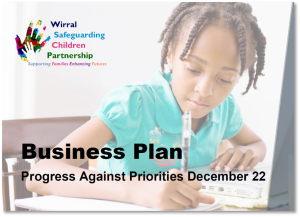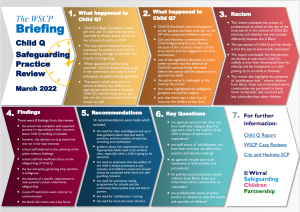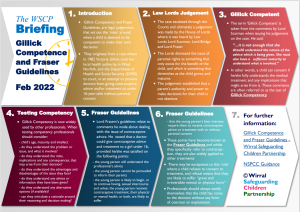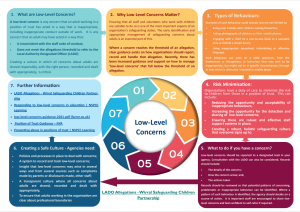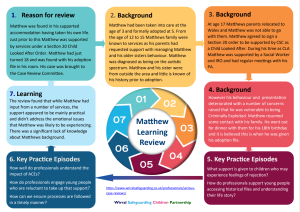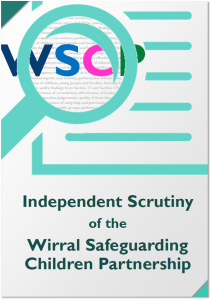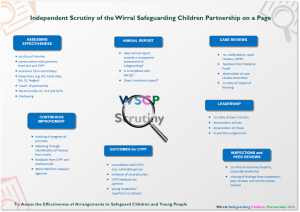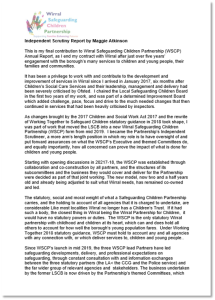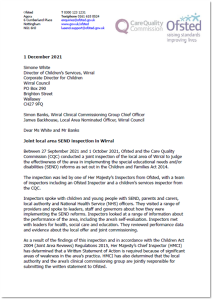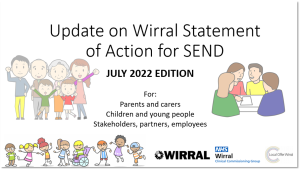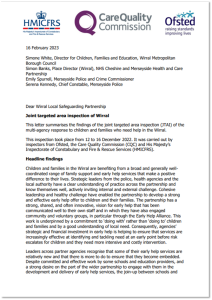Annual Report 2022 – Introduction

In this section:
- Welcome from the safeguarding partners
- The partnership and relevant agencies
- Principles
- Priorities
- Communication
- Independent scrutiny statement
Welcome from the safeguarding partners
It is our great pleasure to welcome you to the annual report covering the work of the Wirral Safeguarding Children Partnership in 2022. This report provides an overview of multi-agency safeguarding activity during the past 12 months, and reflects the hard work and dedication of all our partner agencies as they have safeguarded and promoted the welfare of Wirral’s children and young people.
2022 has seen services return to normal after the disruption of Covid-19. This has been good news to our families who may have been without needed face-to-face meetings. However, the WSCP recognises the huge efforts made by all partner agencies to make sure contact with all children, young people and families who needed support was maintained one way or another during the pandemic. Services also remain ready to respond to safeguarding concerns exacerbated by the pandemic which may, just now become visible.
The year began with us starting to develop a new systemic practice model for working with children, young people and families, and ended with us being the subject of a Joint Targeted Area Inspection for Early help.
We hope you enjoy reading our annual report and that it gives you assurance about the strength and impact of multi-agency working to keep children and young people safe, and also those areas we will prioritise to be further strengthened.
The annual report includes a number of case studies which illustrate the transformative impact that effective multi-agency working can have on children and their families. We will continue to publish case studies throughout 2023 and recognise those within our teams who have ‘been the difference’
The report also includes a review of our priorities and sets out our refreshed business plan for 2023-24.
We remain grateful to all of our partners and their dedicated front line staff for their support and steadfast commitment to safeguarding all of our children.
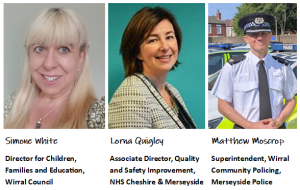
The Partnership and Relevant Agencies
Statutory Safeguarding Partners
The Statutory Safeguarding Partners (the Local Authority, Cheshire and Merseyside Integrated Care Board, Merseyside Police) have equal and joint responsibility for local safeguarding arrangements. The leadership role of the safeguarding partner is based firmly on the notions of authority to act and the accountability for action taken. Its purpose is to:
‘remove the blockages, bureaucracy and organisational self-interest that bar the route to the effective and efficient delivery and practice of multi-agency services to protect and safeguard children.’ Wood Report 2021.
The safeguarding partners in Wirral agree on ways to coordinate safeguarding services; act as a strategic leadership group in supporting and engaging others; and implement local and national learning. All safeguarding partners retain an equal and joint responsibility for local child safeguarding arrangements.
The statutory safeguarding partner representatives on the WSCP in December 2022 were:
- Simone White, Director for Children, Families and Education, Wirral Council
- Lorna Quigley, Associate Director Quality and Safety Improvement, Cheshire and Merseyside Integrated Care Board (NHS)
- Superintendent Matthew Moscrop, Merseyside Police
The safeguarding partners meet bi-monthly.
Relevant Agencies
The safeguarding partners are obliged to set out which agencies are required to work as part of the WSCP’s arrangements to safeguard and promote the welfare of local children. These agencies are referred to as relevant agencies and have a statutory duty to cooperate with the WSCP’s published arrangements.
Representatives from relevant agencies are invited to attend the committees, task and working groups of the WSCP. Agencies are also invited to gather once a year at the WSCP’s annual learning event.
A full list of the WSCP’s relevant agencies can be found here, but in summary the list includes:
- all schools and colleges
- all health trusts and providers serving Wirral
- Merseyside Probation Service
- Merseyside Fire and Rescue Service
- All voluntary, community and faith organisations delivering services to Wirral children
- All charities delivering services to Wirral children
- NHS England
- North West Ambulance Service
- the Child and Family Court Advisory and Support Service
Principles, Values and Behaviours
The following Principles guide the work of the Safeguarding Partners and are promoted by all partner agencies:
- All children and young people have a right to be safe from abuse and neglect;
- All our work is underpinned by the principles of the UN Convention on the Rights of the Child;
- Children and young peoples’ well-being and safety will be at the heart of all our work;
- All children and young people are unique and all our work will consider and address issues of diversity and vulnerability;
- Organisations and their staff have a shared responsibility to work together and safeguard children and young people and promote their welfare;
- Early Help and prevention strategies will be a centrally important aspect of our work
to safeguard children and young people; - The active involvement of children, young people and their families will be incorporated in our work.
To deliver our shared principles all professionals include the following Values and Behaviours in all they do to improve outcomes for children, young people and families:
| Value | Behaviour |
| Improving Outcomes for Vulnerable Children |
|
| Honesty and Integrity |
|
| Leadership and Partnership |
|
| Professionalism |
|
| Equality |
|
| Quality and Standards |
|
| Ambition and Innovation |
|
| Accountability |
|
Priorities
In 2022 the WSCP set four priority areas for 2022-24:
- Response to Neglect
- Supporting Families Enhancing Futures
- Breaking the Cycle
- Violence Against Women and Girls
The full business plan for 22-24 can be found here.
A mid-point review of the priorities took place in December 2022, and the progress made so far is detailed in the document below:
Communication
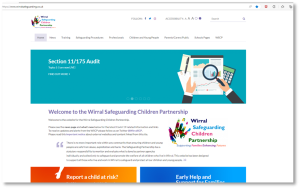
The WSCP website
Key statistics:
- 431 pages, including sections for professionals, children and young people, and parents and carers
- 42,472 visits (Jan-Dec 2022)
- 52,776 separate page views
- 3,539 average visitors per month
- 60% of visitors regularly return. 40% visited for the first time in 2022
- 96% of visitors from the UK. 4% visited from 55 other countries
- Top 10 pages: Training courses (18,000 page views); Concerned about a Child (10,560 views); Contextual Safeguarding and Exploitation (5,437 views); Case Reviews (4,660 views) Early Help (3,111 views); Procedures (2,163 views); Knife Crime (1,523 views); Thresholds (1030 views); 7 Minute briefings (921 views); Adverse Childhood Experiences (747 views)
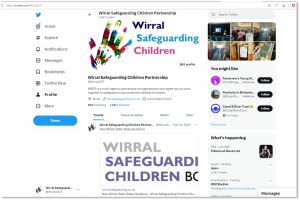
WSCP Twitter
All safeguarding news items published on the WSCP website are also shared through our Twitter account.
- The WSCP has sent 3,867 Tweets
- The WSCP has 1,257 followers
- Our most re-tweeted posts were about the Big Learn safeguarding event in July 2022
WSCP Facebook
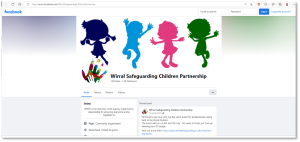
News items are similarly shared on the WSCP Facebook page.
- The WSCP has posted over 2,000 messages on our Facebook page
- The WSCP has 1,500 followers on Facebook
WSCP Instagram
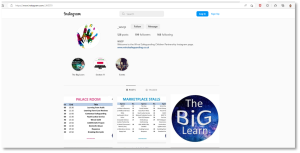
The WSCP now uses Instagram to share images of posters, flyers, training adverts etc.
- The WSCP has share 128 posts
- The WSCP has 199 followers on Instagram
7 Minute Briefings
One of the main ways that the WSCP shares important safeguarding messages is through its use of single side 7 Minute Briefings. All of our briefings can be seen on the website here. A few recent briefings from 2022 are shown below:
Independent Scrutiny
The requirement for independent scrutiny of multi-agency safeguarding arrangements is defined in the statutory guidance Working Together to Safeguard Children 2018. The role of independent scrutiny is to provide assurance in judging the effectiveness of multi-agency arrangements to safeguard and promote the welfare of all children in a local area, including arrangements to identify and review serious child safeguarding cases. This independent scrutiny will be part of a wider system which includes the independent inspectorates’ single assessment of the individual safeguarding partners and the Joint Targeted Area Inspections.
Whilst the decision on how best to implement a robust system of independent scrutiny is to be made locally, safeguarding partners should ensure that the scrutiny is objective, acts as a constructive critical friend and promotes reflection to drive continuous improvement.
Independent scrutiny should consider how effectively the arrangements are working for children and families as well as for practitioners, and how well the safeguarding partners are providing strong leadership and agree with the safeguarding partners how this will be reported.
Safeguarding partnerships are required to set out their plans for independent scrutiny in their published arrangements and include how the arrangements will be reviewed; and how any recommendations will be taken forward. This might include, for example, the process and timescales for ongoing review of the arrangements.
Safeguarding partners should also agree arrangements for independent scrutiny of their annual report.
The WSCP’s model of independent scrutiny is set out in the document below. Our model does not rely on a single scrutineer, but rather gathers information from a variety of sources to help us understand the strengths and weaknesses of the local safeguarding system.
Our model has been finalised over the past few months and will be fully in place in Spring 2023.
Further information and examples of scrutiny activity can be found on the WSCP website here
A simple representation of the scrutiny model on a single page is available below:
Annual Report 2022 – Independent Scrutiny of Safeguarding Practice
Independent Scrutineer report for 2021 (February 2022)
SEND Inspection findings (December 2021) and Wirral Statement of Action (July 2022)
Outcome letter following the inspection of services to support children with special educational needs and disabilities (SEND):
Multi-agency statement of how the findings from the SEND inspection are being addressed:
Children’s Services Peer Challenge May 2022
Wirral Council invited the Local Government Association (LGA) to undertake an independent peer challenge of children’s services.
Key findings from the Peer Challenge:
- children’s services has visible and approachable leaders at all levels of management
- there is a strong commitment to early help and prevention
- there are good partnership relationships at both an operational and strategic level, however, relationships with schools could be improved
- there is an ambitious local regeneration programme and their is potential to align this with the Breaking the Cycle prevention programme
- there is a clear vision for a seamless service across early help and children’s social care but presently the two areas of service are separate and their is an element of ‘them’ and ‘us’
- the Council benefits from a committed, enthusiastic, motivated and skilled workforce
- elected members, especially newly elected ones need to be aware of their corporate parenting responsibilities and the wider support required for children in Wirral
- there are many examples of good practice in working with families, including very strong examples of early intervention work, but there remain inconsistencies of practice around recording, supervision and use of practice models
- thresholds, particularly between level three and four are seen by staff as being too high, although from the cases the peer challenge team saw, children are safe
- children’s services in Wirral has a good base to build on in terms of transferring learning from early help to social work and the positive working relationships across partners.
Child Exploitation Deep Dive Audit October 2022
The WSCP Contextual Safeguarding Committee undertook a comprehensive audit of the multi-agency arrangements to tackle the exploitation of children. The audit was undertaken in line with the Ofsted Joint Targeted Area Inspection (JTAI) methodology.
Three independent peers were invited to oversee the audit process and scrutinise the findings:
Linda Clegg: North-West LGA.
Phil Ashford: Police Vulnerability and Knowledge Practice Programme.
Steve Baguley: National Working Group for Child Exploitation
The audit included a pre-audit survey from partners, feedback from children and young people, a deep dive multi-agency audit of six cases, audit reflection meeting – chaired by the independent peers. The learning points identified by the peers are:
- Ensure that professionals across the partnership are using appropriate language when discussing young people at risk of exploitation
- Ensure that professionals are being curious when working with children and young people, and not to wait for a crisis or significant incident
- Ensure that the child’s voice is documented and in the centre of everything we do
- Ensure that quality assurance of alternative provision and that the newly established Inclusion Team are focused on the most risky young people
- Ensure that earlier intervention is a priority and reporting intelligence is encouraged
- Catch22 to ensure that improvements are made to the analysis section of the RHY and ensure that it is recorded on Liquidlogic
- Priority pathways for those vulnerable children and young people who require health needs to be assessed sooner rather than later.
The independent peers identified that practice in Wirral to tackle child exploitation:
- is strong
- includes appropriate challenge when needed
- is supported by minimal changes in key worker
- is underpinned by good relationships
- benefits from clear management oversight
- has a well developed and effective multi-agency CE (MACE) process and specialist team in place
- has good involvement from the voluntary and community sector
- supports all children even those placed at distance from home
To improve, the peers identified:
- there were missed opportunities for earlier intervention in a number of cases
- some assessments and plans lacked the child’s voice
- in some cases education appeared to be missing from multi-agency forums
- there needs to be wider use of the CE screening tool
- robust use of chronologies was not evidence in all cases
- some assessments included very little exploration of risks outside the home
- there was evidence of the unnecessary criminalisation of children
The areas for improvement are incorporated in the Contextual safeguarding Committee action plan and progress will be reported to the WSCP Executive.
Joint Targeted Area Inspection of Early Help December 2022
In December 2022 the partnership was subject to a Joint Targeted Area Inspection undertaken by Ofsted (for the Local Authority), The Care Quality Commission (for the Health economy), and His Majesty’s Inspectorate of Constabulary and Fire and Rescue Services (for the police).
Purpose
The purpose of the inspection was to test how effective our local arrangements were to support children and families who require early help support. The inspection focused on the 3 statutory agencies of the Local Authority, Health Economy and Police, but also looked closely at the role played by other organisations who support families.
As part of the inspection, the strength of the Integrated Front Door, the quality and impact of front line services, the strength and effectiveness of assessments and plans and the quality of leadership and management were all examined.
JTAI inspections aren’t graded, but partnerships receive a letter providing a narrative summary of the inspection findings and highlighting any areas of concern.
Findings
The letter of findings following the inspection was positive and included the following:
‘Children and families in the Wirral are benefiting from a broad and generally well coordinated range of family support and early help services that make a positive difference to their lives’
‘Leadership and healthy challenge have enabled the partnership to develop a strong and effective early help offer to children and their families. The partnership has a strong, shared, and often innovative, vision for early help’
‘Early help workers’ support to children and their families is highly effective. They are skilled, insightful and knowledgeable. They know and understand the needs of children and families well’
‘Parents described practitioners as ‘a magic key’ to achieving improvements in their children’s lived experiences. They feel that practitioners are invested in them and show genuine warmth and care’
The inspection highlighted four main areas of strength:
- Senior leaders in partner agencies have a shared and well-developed vision for
early help in the Wirral. Staff across statutory and voluntary agencies have
understood and engaged with this. - There is a broad range of locality-based early help and family support services
available to children and their families that are making a positive difference. For
most children who receive services, risk is reduced and their day-to-day lives
improve. - A strong commitment to co-production and to engaging children and their
families means that both the overall range of services and individual children’s
packages of support are increasingly well matched to the needs of children and
families. - The integrated ‘front door’ that receives referrals about children who may be in
need, or require early help, does well in ensuring that children receive timely help
and support that is well matched to their individual needs.
As well as providing much to celebrate the inspection also highlighted four areas of improvement:
- How effectively the early help offer is further developed to ensure greater
consistency of access for children across the local authority area. - The proportion of children receiving early help who benefit from a coordinated
multi-agency plan to coordinate that support and to help ensure that it is as
effective as possible. - How well the early help needs of children with special educational needs and/or
disabilities are met. - The coordination of early help between education providers and the wider
partnership.
Next Steps
The WSCP is required to develop a statement of proposed action, which will be a multi-agency action plan setting out how we, as a partnership, will address the identified areas of improvement. Our plan will be shared with Ofsted in May 2023 and periodically thereafter until we have completed all the actions.
Inspection Letter
The formal letter of findings can be found below:
To go to the Background page click here
To go to the Journey of the Child page click here
To go to the Key Activity page click here
To go to the Multi-agency Working page click here
To go to the Business Plan page click here
To go to the Glossary click here
To return to the Annual Report Home Page click here.

